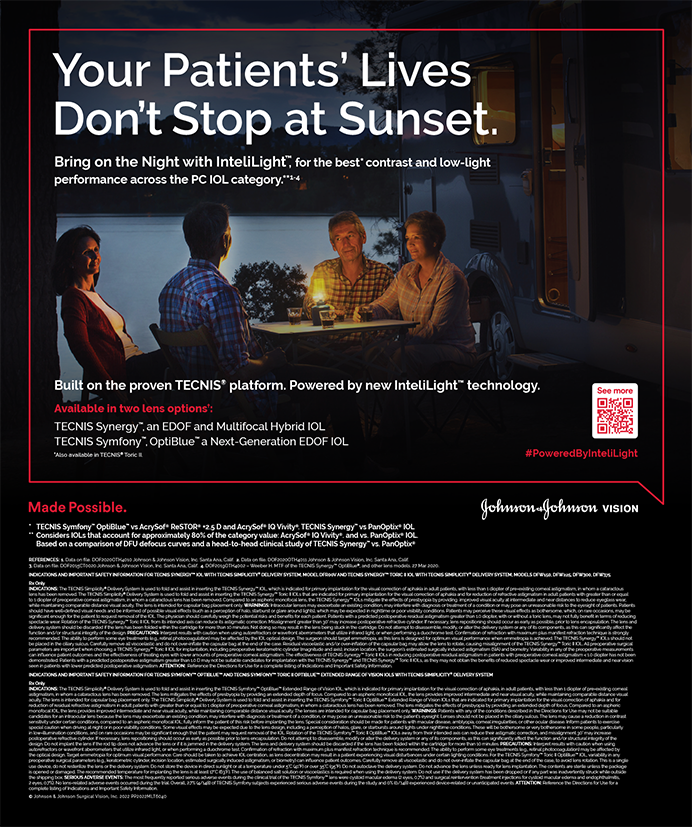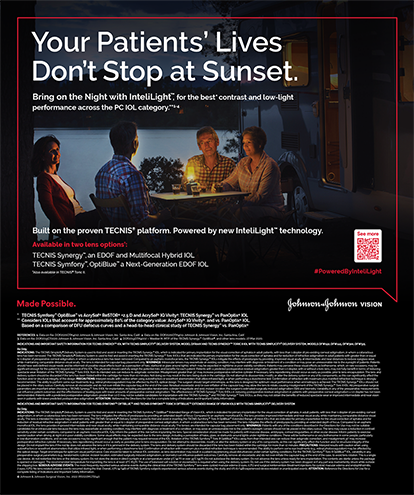Would you fly with a pilot who had never been tested at the controls of an airplane? To operate a car, weren't you evaluated behind the wheel as well as behind a desk? I believe the public would be horrified to know that its surgeons have never been tested for their skills.
THE TREND TOWARD CERTIFICATION
Ophthalmologists are historically iconoclasts. Ophthal-mology was the first medical specialty to require oral and written boards. Imagine the outcry when that concept was promoted within and outside our specialty. ?That's what residencies are for!? the opposition exclaimed. ?Why create an elitist class?? Today, board exams exist in all medical specialties, and certification is no longer controversial. Indeed, even some subspecialties now feature board certification. Establishing minimal standards within the medical profession contributes to the quality control and high standards enjoyed by informed US healthcare consumers.
Although the medical profession lacks a formalized tradition of testing surgical skills, we are not the first to consider the merits of certification. Few physicians realize that dental trainees actually recruit patients to demonstrate a variety of technical skills, such as filling cavities, to their examiners as a requirement to earn their license to practice dentistry. This knowledge gives me a great deal of confidence while I sit in the dental chair. Why must our noble profession lag so far behind? Aren't patients' eyes at least as important as their teeth?
THE ABES MISSION
At its inception nearly 20 years ago, the American College of Eye Surgeons (ACES) was dedicated to the mission of improving the standards of ocular surgery. The novel concept of voluntary surgical skill certification resulted in the establishment of the American Board of Eye Surgery (ABES). In order to develop surgical certification standards for ABES, the Professional Education Service, a nonprofit, independent organization experienced in creating standardized written medical exams, met the challenge to establish statistically valid criteria for evaluating actual surgical skills and results beyond book knowledge. I was first certified in 1991 and recertified in 1998. Certified surgeons perform from 200 to 3,000 cataract surgeries per year, and 80% perform more than 1,200 procedures annually.
Today, ABES upholds identity-masked and peer-reviewed standards for cataract and implant surgery, including penetrating keratoplasty and LASIK. Ophthalmologists and laypeople alike who are unfamiliar with ABES' and ACES' mission to enhance quality of care may not realize that these organizations have jointly developed didactic texts and courses to standardize and enhance the quality of perioperative care for cataract and LASIK patients. These materials are available to all ophthalmologists; certified surgeons may teach a course based on this information for their teams and referral sources, and they are now distributed by request to an increasing number of residency programs. In addition, ACES and ABES offer a mentoring program that pairs novice surgeons with certified surgeons to their mutual advantage.
CERTIFICATION CRITERIA
ABES certification requires prior American Board of Ophthalmogy certification. The cataract certification consists of on-site observation by an experienced, objective technician who only collects objective data about the surgeon, his surgical cases, and surgical facility. The on-site technician verifies and submits the unedited videotapes of the consecutive surgery cases observed. Then, three other certified surgeons on the ABES board review the verified tapes. To qualify, surgeons also submit a log of a statistically derived number of consecutive case data with 6-month outcomes. Moreover, ABES-certified surgeons remain current by submitting to recertification every 7 years.
Significant resources were applied to develop these procedure-specific exams, and although they do not specify the minutiae of technique, there are fatal flaws in surgical technique, judgment, and outcomes statistics that result in failure. These exams are periodically updated, and we believe they are reproducible and valid.
Over the years, the average failure rate for applicants has been 17%. Although some critics may find fault with this exam method, the education service has never been successfully sued. Frankly, I find this failure rate surprising; remember, ophthalmic surgeons presumably aced college to qualify for medical school, were high performers in medical school in order to qualify for residencies, completed ophthalmology residency in good standing, and ultimately passed the oral and written medical board exams. After receiving their degree, those interested in ABES certification voluntarily submit applications and a fee in order to test for the privilege of ABES certification. To me, the 17% failure rate for ABES certification represents an appropriately significant but not insurmountable benchmark.
THE FUTURE
To date, the value of ABES credentialing to the ophthalmologist has been mostly limited to the personal edification of the volunteering practitioner. Patients benefit when they receive referrals to surgeons who have proven skills based on peer certification. We at ABES hope that our quest to improve ourselves professionally as surgeons results in the widespread adoption of this practice within ophthalmology and ultimately throughout the surgical fields.
We invite all practicing ophthalmologists to join the ranks of those who have been certified. We ask all educators and ophthalmic organizations to consider the merits of certification and take advantage of the investment already made by ACES in creating this system. We plan to promote the “Monday morning quarterbacking” concept of reviewing and learning from surgical videos by expanding the current resident video contest offered by ACES and ABES. We will initiate a voluntary certification test that enables senior-year residents to distinguish themselves.
We anticipate little objection to these goals from the public's perspective. When patients' needs are paramount, their caregivers usually benefit. Let's provide more patients with the power to select a credentialed physician and surgeon. The American public deserves this knowledge.Lisa Brothers Arbisser, MD, is in private practice in Davenport, Iowa, and is immediate past President of the American College of Eye Surgeons. Dr. Arbisser may be reached at (563) 323-8888; drlisa@arbisser.com.


